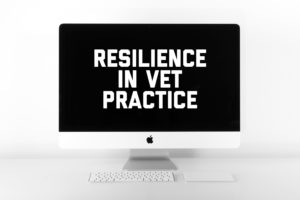5 Ways to Boost Workplace Resilience in Veterinary Practice
Veterinarian clinics in Australia are experiencing high turnover rates and staff shortage due to mounting pressure and stress. It doesn’t help that technological advances have made us all hyperconnected. Practicing vets already work long hours and are often on call for emergencies, so the added pressure of being online and reachable at all times can lead to burnout.
To combat negative stress, you need to be resilient. Resilience is not just about bouncing back from adversity, it’s also about growing in the face of challenges. This type of mental fortitude makes you well-prepared for challenges ahead and allows you to thrive in a high-stress workplace.
 Research shows that high resilience is associated with lower prevalence of burnout, anxiety attacks, depression, and post-traumatic stress disorder. Enhancing resilience is a combination of mindset, social support, and behaviour. While some people are more resilient than others, it’s possible to boost resilience with the right coping strategies and techniques.
Research shows that high resilience is associated with lower prevalence of burnout, anxiety attacks, depression, and post-traumatic stress disorder. Enhancing resilience is a combination of mindset, social support, and behaviour. While some people are more resilient than others, it’s possible to boost resilience with the right coping strategies and techniques.
Build strong social connections
A strong support system is essential to enhancing resilience. Social connections, whether inside or outside the workplace, can provide emotional support during stressful times. According to a survey, the most common sources of emotional support are friends (48%), significant other (44%), other family members (31%), and parents (24%).
Friends outside of work can be a safe space for airing out work-related issues, but having coworkers as friends is equally valuable. Research shows that low social support in a high-stress workplace is associated with lower quality of life and absenteeism. On the other hand,
Improving workplace culture through simple interventions like giving proper recognition and creating
social spaces, can enhance camaraderie and form meaningful bonds for employees
in the veterinary practice. Another way is by cultivating Conversational
Intelligence which focuses on communication that is rooted in empathy and WE-centric
language.
Set boundaries
Practicing vets are prone to compassion fatigue because of the nature of our work. Being too available to patients and co-workers is one of the causes of compassion fatigue and burnout, so learn how to set boundaries. Giving out your personal number and accepting Facebook friend requests may seem like a good idea, but this can lead to after-hour calls or clients getting too close for comfort.
Practice mindfulness
In reality, veterinarians often don’t have control over “on call” emergencies and workload, so practicing mindful meditation gives you that space to clear your mind from clutter. There is a growing body of research using mindfulness-based resilience training programs to combat burnout and improve talent retention in high-pressure jobs.
Mindfulness expert Mirabai Bush, who famously introduced mindfulness training to Google, says that the practice of mindfulness over time can help increase your awareness of your own emotions and help you respond in the most compassionate way.
Mindfulness can begin as a simple one-minute meditation in a quiet space in the workplace. Beginners may opt to download apps like Headspace, Calm, or Smiling Mind to get guided meditation and build this habit over time.
Foster intrinsic motivation
In psychology, intrinsic motivation is a stronger force than extrinsic motivations. It means your drive comes from within instead of external factors like salary or recognition. In vet practice, it means the work itself and the passion for animal care will be the fuel that gets you out of bed each morning to go to work.
Psychologists Edward Deci and Richard Ryan say that external rewards like incentive programs and bonuses can only provide short-lived motivation. The more sustainable source of motivation comes from within and it is driven by autonomy, relatedness or meaningful work, and competence.
To encourage autonomy, allow team members to set individual goals. To increase relatedness, reaffirm the company’s values through volunteer programs related to animal welfare and integrating socially responsible practices into the workplace. Going paperless, upcycling materials, or supporting local suppliers creates pride in an organisation and adds meaning to your work. Finally, to develop competency, set a clear path to career advancement. A mentorship program can help identify the interests of employees and therefore create opportunities for mastery.
Be flexible
Work hours and workload can be unpredictable in vet practice. One day you could be treating a parvo outbreak in a litter of pups, the next you could be prepping for an emergency orthopaedic surgery. To keep up with the changing needs in the clinic, you need to be flexible. If one member gets sick, you may be called to step up and cover the shift.
Change is essential for a company’s survival. So, prepare for the worst, but hope for the best.
With a supportive team and adaptive coping mechanisms, pressure and stress can stretch your limits and make you more resilient. Once organisational resilience is in place, your practice is capable of overcoming any change or difficulty that comes your way.

